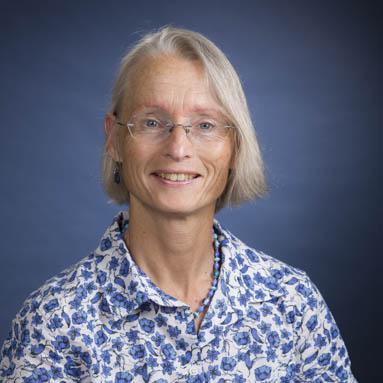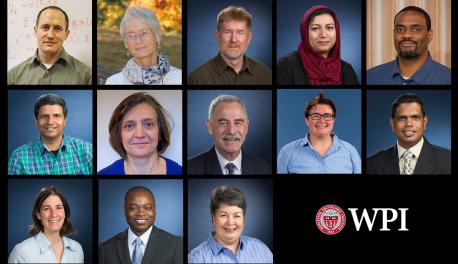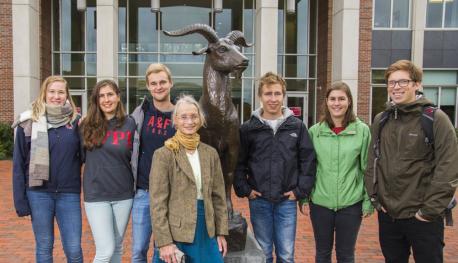

Coming from a family with a long teaching tradition going back at least to her great-grandfather, teaching has always been fundamental to Professor Brisson’s well-being. Being a German professor at WPI in particular has been a great privilege because the students are motivated, hardworking, and eager to learn. She feels that teaching German language and culture is particularly important at an engineering school with a strong focus on environmental technology and sustainability for a number of reasons. Germany is a leading nation in environmental technology, and WPI students always cite this aspect as one of the reasons why they want to learn German. Many forms of German culture are known worldwide (music, literature, philosophy, art). Having knowledge of these traditions and of the language in which they are embedded spurs a student’s curiosity and interest in connecting with people of different backgrounds. A project sponsor, who himself is an engineer in Namibia, once said that you can fix almost all technical problems as an engineer, but you need to have knowledge of a people and their culture to solve the larger problems related to the technical ones. From this perspective, Professor Brisson considers German, as part of the humanities and arts education, crucial for future professionals.
Learning a foreign language is a skill that enhances language awareness in general and motivates students to explore linguistically unknown territory. Taking the students on this journey of discovery has always been an exciting and deeply rewarding adventure for Professor Brisson. This aspect relates to her research interest, which focuses on travel writing (particularly 19th-century women’s travel writing) backed up by literary theory, colonialism and postcolonialism, feminism, ethnography, geography, and history.
Professor Brisson also finds translating narratives from English into German a fascinating linguistic and intellectual exercise. Although often underestimated, translations have always played an important role in transcultural relations. Isn’t it often through translated works that we become exposed to new ideas?
To stay up to date, Professor Brisson regularly attends and offers workshops in language pedagogy. She enjoys interacting with her students and her colleagues at WPI, and she has contacts with her German colleagues at the postsecondary and secondary level throughout New England.

Coming from a family with a long teaching tradition going back at least to her great-grandfather, teaching has always been fundamental to Professor Brisson’s well-being. Being a German professor at WPI in particular has been a great privilege because the students are motivated, hardworking, and eager to learn. She feels that teaching German language and culture is particularly important at an engineering school with a strong focus on environmental technology and sustainability for a number of reasons. Germany is a leading nation in environmental technology, and WPI students always cite this aspect as one of the reasons why they want to learn German. Many forms of German culture are known worldwide (music, literature, philosophy, art). Having knowledge of these traditions and of the language in which they are embedded spurs a student’s curiosity and interest in connecting with people of different backgrounds. A project sponsor, who himself is an engineer in Namibia, once said that you can fix almost all technical problems as an engineer, but you need to have knowledge of a people and their culture to solve the larger problems related to the technical ones. From this perspective, Professor Brisson considers German, as part of the humanities and arts education, crucial for future professionals.
Learning a foreign language is a skill that enhances language awareness in general and motivates students to explore linguistically unknown territory. Taking the students on this journey of discovery has always been an exciting and deeply rewarding adventure for Professor Brisson. This aspect relates to her research interest, which focuses on travel writing (particularly 19th-century women’s travel writing) backed up by literary theory, colonialism and postcolonialism, feminism, ethnography, geography, and history.
Professor Brisson also finds translating narratives from English into German a fascinating linguistic and intellectual exercise. Although often underestimated, translations have always played an important role in transcultural relations. Isn’t it often through translated works that we become exposed to new ideas?
To stay up to date, Professor Brisson regularly attends and offers workshops in language pedagogy. She enjoys interacting with her students and her colleagues at WPI, and she has contacts with her German colleagues at the postsecondary and secondary level throughout New England.

